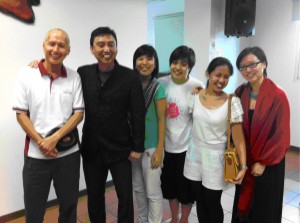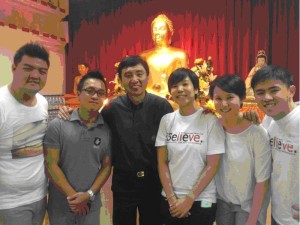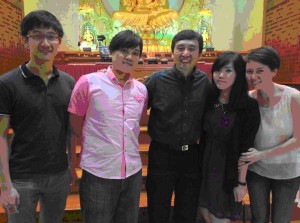Text and images by Michelle Paduma Ang
“Mind-blowing.” “Fascinating.”
You would often find these two words peppered in Meng’s workshop or talks.
Meet Tan Chade Meng (Chade-Meng Tan). Or simply, Meng.
Meng is well known for many things. Besides holding the title of being a “Jolly Good Fellow”, he also holds several titles such as “Prince Charming” for his One Billion of Peace Act. You might also want to know what Meng has done and who he has met since he started his quest for World Peace.
First Singaporean to work at Google? Checked.
Speak at TED conference? Checked.
Speak at the United Nations? Checked.
Take a photo with the President of United States, Barack Obama? Checked.
Speak along side top model Jessica Stam? Checked.
Getting a hug from His Holiness the 14th Dalai Lama? Checked.
Rubbing shoulders with Archbishop Desmond Tutu? Checked.
On his blog, Meng simply describes himself as “a random generic guy”.
Is this guy trying to act humble or what? Let’s find out.
# First Impression Counts
At Tai Pei Buddhist Centre
In 2012, when I first attended Meng’s talk about his program and book, Search Inside Yourself (SIY), it was as if I was learning meditation all over again. I was amazed and inspired at how he managed to concise and teach mindfulness and meditation into such an accessible and bite-sized manner. I was not new to the concept of meditation but it certainly felt as if I was discovering it all over again!
After the talk, I went up to him and chatted with him for a while. Well, okay, I didn’t talk to him. My friend did most of the talking and I did the listening. There was something about his presence and personality that seem to make people naturally drawn to him. He reckons it’s his super good looks, but I disagree. I think it’s definitely more than that. He seemed like a really nice, cool, guy.
Biggest takeaways:
- Can you calm your mind on demand?
- Meditation is like doing bicep curl to the mind. Every time you lift the weights, you train your muscles. Similarly, every time you meditate, you are doing bicep curls for you mind.
- Calm Mind. Develop Insight. Nourish the Heart.
#Second Time Lucky
At Singapore Buddhist Mission, organised by Buddhist Youth Network
In 2013, I jumped at the opportunity to learn from Meng again when he was back in Singapore. This time, I decided not to hold back. I even prepared a list of questions to ask him.
During the youth dialogue, I asked him who were his spiritual inspirations, how did he overcome negativity and adversities in his life, and how he remained humble and grounded despite all the success and media attention he was getting (and still is).
After the dialogue, I went over with a friend to further clarify a few things he said. After speaking to my friend, he saw me and I said hi to him. Before I could say another word, he held both my hands together and said to me,
“So Michelle, tell me more about yourself.”
“…..I errr….. *awkward laughter* Well….I’m still discovering myself!”
Totally caught off guard and was dumbfounded.
Dumbfounded by his down to earth-ness.
This person, who has met so many famous people in his life, who has spoken at TED, spoken at UN, actually bothered to remember my name, took the effort and time, to actually want to know me?
I was taken aback by this very simple act of gesture.
The power of presence, and a simple touch.
Biggest Takeaways:
Having the confidence in oneself, stability of the mind and ability to recover: This was Meng’s reply when I asked him how he overcame times when he was low. He said when he faced an ordeal and was affected by it, he would tell himself that he would recover by a certain date, and he would do so when that date arrived.
He also shared the three main bodies of his practice:
- Body: Theravada Practice – Stability of mind
- Heart: Varjaryana Practice – Compassion and emptiness
- Soul: Zen Practice – being and beyond being
Or to break it down even further:
1. Samatha Practice – establishing concentration
2. Vipassana Practice – using a calm, clear and objective mind to reflect on wisdom
3. Brahma Vihara Practice – motivation for compassion
Read Meng’s reflection on embracing suffering in The Art of Suffering is Love
Dichotomy of Self: When I asked Meng how he remained grounded despite all the fame, he said he saw himself as another person, i.e. he was not him, he saw him as a dichotomy of himself. “Who is this guy? He seems pretty cool. Hey, I want to be just like him.”
Meditation Practices:
Just Like Me: “This person, in front of me, has a mother, has a father. Just like me. This person, in front of me, also has anger, just like me. This person, in front of me, also feels sad, hurt and pain, just like me.” During this exercise, Meng led us in a practice where we put ourselves in another person’s shoes. I was so inspired by this practice that I brought it back to try it with the youths at SBF for our next sharing.
One Breath a Day: All it takes it one breath. Just be focused on one breath per day. Simple, short and sweet. No excuses, because we all need to breathe right?
#Third’s a Charm
At Vimalakirti Buddhist Centre, organized by Buddhist Youth Network
Meng is back for his summer vacation and being the fan girl that I am, signed up for a recent workshop he was conducting. Recapped and revised things he said two years back and learnt new ones too.
He also kicked us all (or at least me) in the butt when he blatantly pointed out to us on the biggest difference (and problem) between Buddhists in the East and Buddhists from the West.
Due to the lack of time, I didn’t manage to ask him any questions this time. After the workshop, we went over to have our photos taken with him. He saw me, gave his toothy grin and said, “Hi Michelle.”
And then what Meng shared with all the leaders that day really hit me.
Confidence + Presence + Warmth = Charisma
Confidence:
- Comes from knowing your stuff and knowing yourself
- Understanding and practicing equanimity
- Resilience – knowing that you can recover and the willingness to witness suffering and unhappiness within yourself
Presence:
- Mindfulness
- Compassion – I feel for you, I understand you, I want to help you
Warmth
- Metta (Loving-kindness)
- “I’m very happy to see you.”
He makes the effort and bothers to remember your name. When he talks to you, he gives you undivided attention and his presence.
This, to me, is what makes great leaders, so special.
Biggest takeaways:
- PRACTICE. PRACTICE. PRACTICE. Perhaps the root cause of all the issues faced by Buddhist groups and leaders, the lack of self-practice.
- Aspirations
Countless are all sentient beings. I vow to love them all.
Countless are all sentient beings. I vow to liberate them all.
- Self is not an object; self is a process.
P.S. Meng’s job description on his name card is really ‘Jolly Good Fellow (which nobody can deny)’. He showed the audience his name card once, for those doubtful few.
Oh and his job description?
Enlighten minds. Open hearts. Create World Peace.
If you would like to know more about Meng and his work, just look for the jolly good fellow at the Google office in California. Or well… just google his name.
Be prepared for more fascinating discovery and mind-blowing action from this ‘Peace Charming’.
Check out One Billion Acts of Peace and help Meng achieve his goal!
Michelle (Paduma) is currently the Vice-President of Singapore Buddhist Federation (SBF) Youth. She also writes for SBF publication Nanyang Buddhist and for For You, a monthly Buddhist publication. She can be reached at [email protected].



Leave a Reply